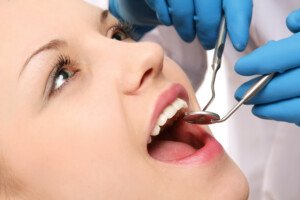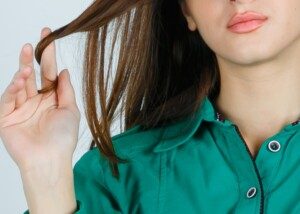
Is repeatedly clicking your teeth throughout the day one of your autistic stims and you’re wondering if over time, this could damage your teeth or bite alignment?
If you read the posts in online autism threads about stimming, every so often one will pop up about clicking the teeth.
NOTE: “Teeth clicking” and “clicking one’s teeth” refer to tapping the upper row of teeth to the bottom row with very brief contact — rather than with pressure as though to penetrate food.
Clicking or tapping of the teeth is NOT to be equated with bruxism or grinding of the teeth, in which the upper and lower rows of teeth forcefully slide along each other.
Though some people may call bruxism “clicking of the teeth,” they are entirely different actions, even though a person may find themselves doing both.
Stimming (self-regulating behavior) is extremely common in autistic people.
Many stims involve the mouth in some way. In fact, many autistic people favor “chewelry,” which are items they can freely nibble on but appear to be necklaces or bracelets.
Some Autistics chew on their collars or shirt sleeves, while others stim with their fingers involving their mouth, such as in repetitive licking of their fingertips or nails, or prolonged but gentle biting on an area between the finger joints.
And then there are those who click their teeth. This may occur hundreds of times in a single day.
None of these stims are indicative of the individual’s level of independence in society – and in fact, are often consciously suppressed when they’re in public to avoid appearing fidgety or “weird.”
Can teeth clicking be harmful?
This usually starts up subconsciously. It’s not as though the Autist suddenly decides, “Time for some teeth clicking.”
They may not even realize they’ve been doing it all morning until they finally realize they’ve been doing it all morning.
Since this stimming behavior can easily be done at a high volume, it’s natural for the Autistic to wonder if, over time, it can lead to some kind of tooth damage or perhaps a misalignment of the bite.
“Teeth clicking as a habit itself will not cause any damage to the teeth or change your bite alignment,” says Jarri Amini, DDS, a general dentist who runs myprivatedentist.com, which helps people find dentists and gives dental advice.
Dr. Amini explains, “The forces at play are extremely light in comparison to eating or grinding, for example.
“Therefore, there is very little chance of the teeth chipping because of this.
“In theory, if you were clicking your teeth an excessive amount, this could put some strain on your jaw muscles and joint, but generally this is very unlikely.”
In addition, high volumes of clicking or tapping will not loosen the teeth or dislodge a filling.
So if your Autism Spectrum Disorder leads you to frequent and repetitive clicking of your teeth – such as in my case – then you can keep on stimming this way without any worry.
 Dr. Amini is based in the UK and has been practicing all aspects of dentistry for 12 years. My Private Dentist facilitates connections between patients and dentists, improving patient experience by making dentists and their highly skilled services more accessible across the country.
Dr. Amini is based in the UK and has been practicing all aspects of dentistry for 12 years. My Private Dentist facilitates connections between patients and dentists, improving patient experience by making dentists and their highly skilled services more accessible across the country.
 Lorra Garrick has been covering medical and fitness topics for many years, having written thousands of articles for print magazines and websites, including as a ghostwriter. She’s also a former ACE-certified personal trainer. In 2022 she received a diagnosis of Level 1 Autism Spectrum Disorder.
Lorra Garrick has been covering medical and fitness topics for many years, having written thousands of articles for print magazines and websites, including as a ghostwriter. She’s also a former ACE-certified personal trainer. In 2022 she received a diagnosis of Level 1 Autism Spectrum Disorder.
.









































